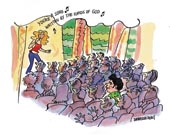 |
Last week Shakira was in the same frame again with Gabriel Garcia Marquez, with whom she opened an NGO for poor children, thereby giving me a reason to say what I wanted to say for long.
I have been a Shakira watcher since the blond-locked Colombian bounded into my TV singing Whenever Wherever, looking like a beautiful wild horse on the run. I have watched her since, without often understanding what she sings with my zero Spanish, less Latin and an imperfect ear for English; I wish audio CDs also came with subtitles. But I have watched Shakira for years — and I love her.
I have watched her lose the fullness of early youth and watched her cheekbones take on a sharp edge that can define the onset of maturity in women — and have loved her changing face. Shakira, who writes her own songs, is only 30, though.
I have tried to find out why I, not a very musical person, like her so much. It’s not only her sound, which is kind of barefoot like her, unadorned and less electronic, compared to many of her colleagues, though that too. It’s not her wild blond hair streaming out, though that too. It’s not that amazing thing she does with her hips, though that too. It’s not the fact that she has won countless Grammies and the works and has one of the world’s greatest writers and fellow-Colombian Marquez and the Venezuelan rock star President Hugo Chavez rooting for her, though that reinforces my belief that great minds think alike.
I think it’s her voice, its power, though some feel it is quite common — but mostly the things she says. Yes, she can be loud, crude, but she is always real. She says things with a disarming directness, going deep down, peeling layers of clothes (and underclothes) off her man to get into what lies beneath. Metaphorically. She sings with her guts. And though she looks like a sex-goddess, there’s some dazzling poetry breaking through her songs and a music independent of the music. That’s what must have got Marquez.
Underneath Your Clothes, she says, there’s an endless story, “There’s the man I chose/ There’s my territory.” Him she likens to “a song written by the hands of God”.
She can be obsessive about a body part. In Eyes like yours, she goes on “Came from Bahrain, got to Beirut/ Looking for someone comparing to you/ Tearing down windows and doors/ And I could not find eyes like yours.” The next lines spring a stunning visual: “Oh, You know I seen/ A woman of means/ In rags and begging for pleasure/ Crossed a river of salt/ Just after I rode/ A ship that’s sunk in the desert.”
The Arab world and its images are no coincidence — Shakira was born Shakira Isabel Mebarak Ripoll Reath and her father is of Lebanese Catholic descent. Shakira means the graceful one. She has taught herself English to write these — and she says she can still love only in Spanish. She has stood on the edge of the world of despair and madness.
She can look at her body clinically and talk about razors, shaving creams, her humble breasts, her strong legs, her eyes, her lips, in the same breath, while her body keeps the sex-goddess act going. It’s one of Shakira’s dual acts. In The One she says: “So I find a reason to shave my legs/ Each single morning…” She can talk about mundane things easily: “I’d like to be/ The kind of dream you’d never share/ To be your boss and to be your maid/ Your shaving cream, your razor blade/ The buttons of your shirt/ Your favourite underwear.” The underwear theme again.
She is playful. She invents words like “thereover”, “hereunder”. She can write bad poetry. Maybe it sounds so bad because it’s in English, but in Objection, the first song she wrote in English, which was part of Laundry Service, she goes: “Next to her cheap silicone I look minimal/ That’s why in front of your eyes I’m invisible”…and “This is pathetic/ And sardonic/ And sadistic/ And psychotic.” This doesn’t work.
Now she sings Hips Don’t Lie, featuring rapper Wyclef Jean and Wyclef Jean screams “Shakira, Shakira” and she does that thing with her hips, which could be belly-dancing, but which looks like something that can never be taught, something one is born with, and Shakira says “Oh baby when you talk like that/ You make a woman go mad/ So be wise and keep on/ Reading the signs of my body” and then many women go mad too. So many times I have felt the urge to learn to do the Shakira thing.
But my all-time favourite is the number through which I knew her first — Whenever, Wherever. It shows Shakira doing what she does best — shaking, dancing, undulating her hips, and carrying out her best dual act, while she begs and pleads like a slave before her man, with elemental passion, while elements of nature like the seas, mountains and storms form the moving backdrop, she remains a monumental, towering, unsubservient women, equally desired and desiring. The whole thing may be one act, really — she is a “natural” performer.
But I can no longer stop myself from singing:
Whenever, wherever
We’re meant to be together
I’ll be there and you’ll be near
And that’s the deal my dear
Baby I would climb the Andes solely
To count the freckles on your body
Never could imagine there were only
Ten million ways to love somebody
Le ro lo le lo le, Le ro lo le lo le
Can’t you see I’m at your feet.
chandrima@abpmail.com












